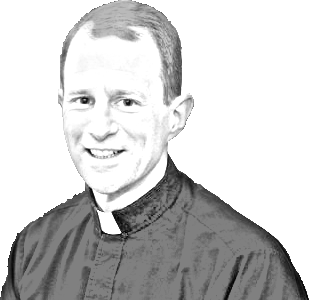It is April, and in the Jesuit community that means that Fr. Otto Hentz, S.J., has begun offering his annual daily prayer of petition at our evening Mass, “for students, and especially seniors, at this ambiguous time of the end of the semester and preparing for graduation.” That word — ambiguous — always stands out to me, and over the years I have come to appreciate the wisdom it contains, for this time of year is indeed an ambiguous one.
We feel the end of the academic year approaching, and with it the pressure of wanting to finish our courses and commitments well. Yet, we are also already thinking ahead to summer jobs and internships. Part of us is drawn to linger, to recognize and to celebrate the accomplishments and friendships and new sense of ourselves that we have gained since September.
Seniors feel this sentiment in a particular way, as they savor their final days on the Hilltop as undergraduates and reflect on the highs, lows and in-betweens that they have experienced; yet they know they are entering a future whose contours are yet to be discovered.
However, this time is no less ambiguous for first-year students, who have experienced what seems like 10 years of life in only nine months. These students wonder if it is possible to return to home and their pre-Georgetown selves. Even faculty and staff, who each year undergo this cycle, still struggle with the goodbyes and the sense of wondering over what next year will bring.
At Georgetown University, most of us are not very comfortable with ambiguity, and we do everything we can to avoid it. We plan ahead — way ahead, in many cases — and we hedge our bets with multiple applications and fallback plans. We find coded ways to talk about what we do not yet know, speaking about the many “options” we are considering, and we gently avoid hard and specific conversations about the future. And when we look backward, we paper over the struggles we have had along the way, not sure how to integrate them into a narrative that we think is only supposed to contain successes.
But this ambiguous time is a special time, one that deserves our attention even if we cannot fully understand or control it. Anthropologists and theologians who reflect on life stages call it a liminal time — a threshold moment — when we are suspended between one defining sense of ourselves and another. This limbo is disorienting, but it is also pregnant with the promise of new life and a new way of being. Religious traditions tell us that it is at this moment that grace is given, when the mystery of ourselves touches the mystery of being and we find ourselves open enough to be transformed and given new purpose. This threshold moment is a sacred time.
The Jesuit Pierre Teilhard de Chardin — whose words are inscribed above the notorious “stairs of death” in the Intercultural Center — composed a prayer for this time. In words that perfectly fit our Georgetown community, he notes that “we are impatient of being on the way to something unknown, something new.” Yet, he tells us, all progress “is made by passing through some stages of instability.” In fact, he calls this suspended time holy and invites us to trust in the “slow work of God” that occurs in it.
Teilhard’s embrace of the uncertain makes me wonder how we might better acknowledge the limits that are at the core of our humanity. We are used to celebrating achievement and mastery, but perhaps we would do well to also embrace our limits and half-successes and still-not-decided efforts. Maybe we should give ourselves — and God — the benefit of the doubt that what lies ahead, yet unrevealed, will actually fulfill us and make us even more whole. It could be that by recognizing that we are incomplete, we can allow grace to complete us in ways we could never imagine on our own.
Transformation — both personal and communal — happens at unsettled moments like these. Out of ambiguity emerges the person long dreamt of, and we come to see that the dream has been as much God’s as our own. So in these days of April, let us choose to live our liminality, letting grace carry us over the threshold into a future not yet known but overflowing with possibility.
Fr. Matthew Carnes, S.J., is an associate professor in the Department of Government and the School of Foreign Service. He currently serves as the director of the Center for Latin American Studies and is a Jesuit-in-Residence in Kennedy Hall. As This Jesuit Sees It appears online every other Monday.














